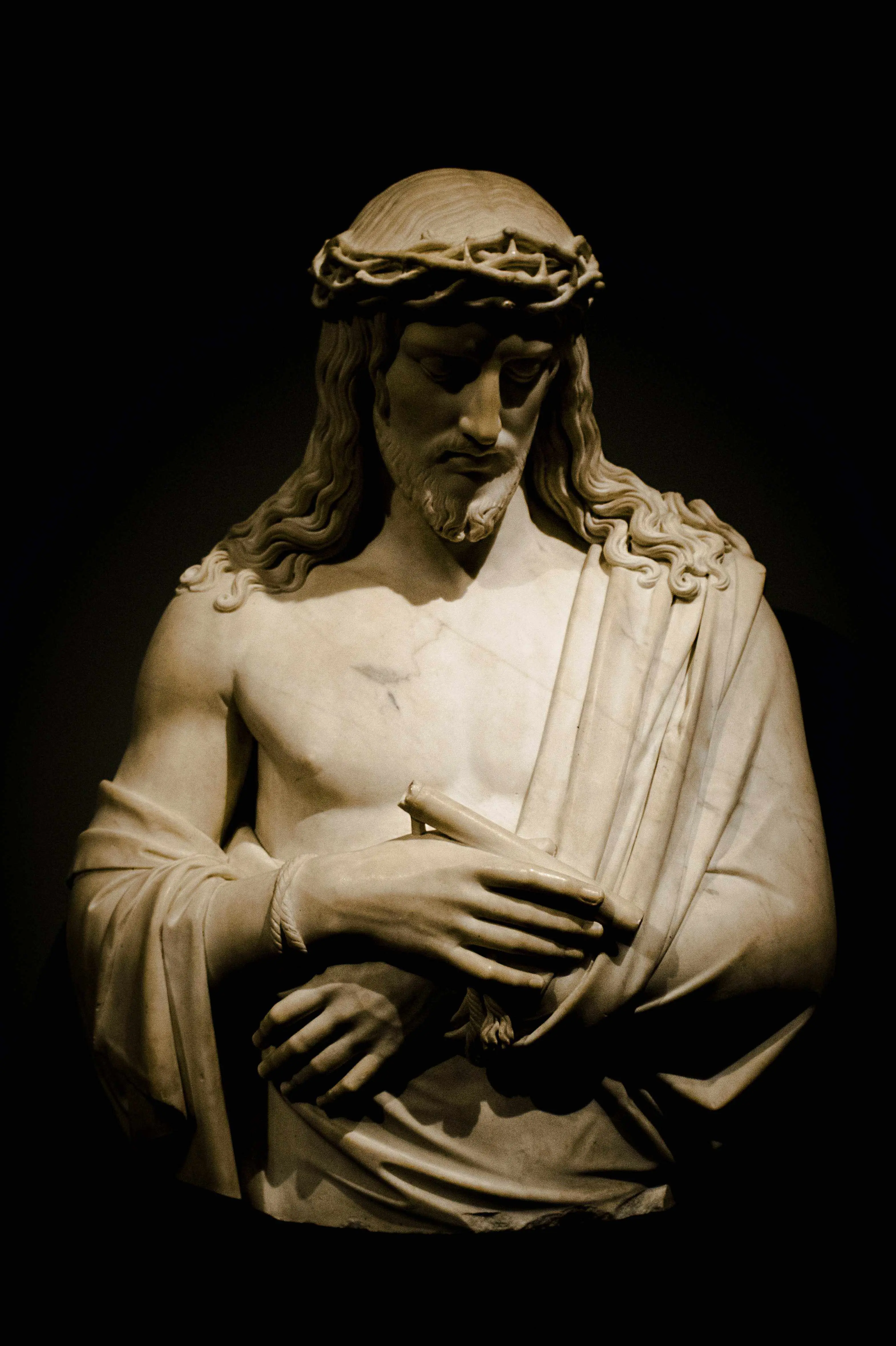When Jesus comes before Pontius Pilate in the Gospel of John, Jesus shows us what truth is (a Person), and each person needs to have truth in the heart to hear Jesus’s voice and be led to Him, who is Truth.
Pilate asks Jesus whether he is the King of the Jews
When Pilate first brings Jesus into the praetorium, Pilate asks Jesus whether he is the King of the Jews. Jesus immediately answers him, asking whether Pilate’s question came from within himself or he (Pilate) simply wanted to confirm what others were saying about Jesus being or claiming to be the King of the Jews.
Pilate’s response is interesting: he rhetorically asks Jesus, “Am I a Jew?” In other words, you are not my king, even if you are the King of the Jews, because I am not a Jew. Pilate at this point is trying to make sense of the claim that Jesus has some kind of temporal power. Pilate continues by saying that Jesus’s own people handed him over to him, so he wants to know what Jesus did. Again, Pilate wants to hear Jesus’s side of the story. On the surface, one would think Pilate wants to figure out the truth of the situation, but the problem with this idea is that Jesus was brought to Pilate and is being questioned by him because of Pilate’s fear that Jesus may be a king. Pilate fears the truth. He wonders whether this person, Jesus, could have a temporal power claim greater than his or even greater than Rome’s. Pilate, it seems, does not care about Jesus per se; rather, Pilate seems to care about whether Jesus is at odds with his power and the power of Rome.
Jesus responds to Pilate by explaining the nature of Jesus’s kingship: “My kingdom is not of this world; if my kingdom was of this world, my attendants would struggle that I might not be yielded to the Jews. Now, however, my kingdom is not from here.” Jesus makes two important points here: (1) Jesus’s kingdom is not of this world; it is from somewhere else (i.e., it is supernatural) and (2) Jesus’s kingdom now is not from here.
What does this mean? It means that God planned a divine invasion of his kingdom into the world from all eternity, and when His Son came into the world on that first Christmas night, as the Gospel of Luke says,
καὶ ἐξαίφνης ἐγένετο σὺν τῷ ἀγγέλῳ πλῆθος στρατιᾶς οὐρανίου αἰνούντων τὸν θεὸν καὶ λεγόντων Δόξα ἐν ὑψλίστοις θεῷ καὶ ἐπὶ γῆς εἰρήνη ἐν ἀνθρώποις εὐδοκίας (and all of the sudden with the angel a multitude of the army of heaven came praising God and saying, ‘Glory to God in the Most High and peace on earth among men who delight him.’)
The angel appeared to the shepherds, and after telling them that the Christ had arrived and was wrapped in swaddling clothes and lying in a manager, the shepherds saw a multitude of the army of heaven. God was invading this world, and he declared that peace would be on those who delight and please him.
Furthermore, Jesus came to bring supernatural life, as Luke 17 teaches:
Ἐπερωτηθεὶς δὲ ὑπό τῶν φαρισαίων πότε ἔρχεται ἡ βασιλεία τοῦ Θεοῦ ἀπεκρίθη αὐτοῖς καὶ εἶπεν Οὐκ ἔρχεται ἡ βασιλεία τοῦ Θεοῦ μετὰ παρατηρήσεως οὐδὲ ἐροῦσιν Ἰδοὺ ὧδε ἤ Ἐκεῖ ἰδοὺ γάρ ἡ βασιλεία τοῦ Θεοῦ ἐντὸς ὑμῶν ἐστιν (Now after having been questioned by the Pharisees when the kingdom of God is coming, he answered them and said, ‘The kingdom of God does not come with inspection as evidence from sight nor will they say Behold here or Behold there, for the kingdom of God is within you all.)
In the Gospel of Luke, then, Jesus tells the Pharisees that the Kingdom of God is within them, and in the Gospel of John, Jesus tells Pilate that the kingdom of God is not from here. Notice that in the first case the Pharisees believe that God’s kingdom will reign, but they believe it will be something external and seen by inspection and evidence of the eyes (μετὰ παρατηρήσεως).
Jesus tells Pontius Pilate his kingdom is from another place
Jesus points out that this is not the case and that the kingdom reigns within the person. In the second case with Pilate, Jesus explains that the Kingdom has no natural origin, which is Pilate’s main concern, but instead the Kingdom has a supernatural origin—one beyond the bounds of Rome and the world itself. Pilate does not really understand Jesus or even know how that can be possible, but Pilate understands that Jesus said he has some kind of kingdom, so Pilate asks Jesus,
εἶπεν οὖν αὐτῷ ὁ Πιλᾶτος, Οὐκοῦν βασιλεὺς εἶ σὺ; (Then, you are a king?)
Now Jesus reveals more to Pilate, who is clearly confused:
ἀπεκρίθη ὁ Ἰησοῦς Σὺ λέγεις ὅτι βασιλεύς εἰμι. ἐγὼ εἰς τοῦτο γεγέννημαι καὶ εἰς τοῦτο ἐλήλυθα εἰς τὸν κόσμον ἵνα μαρτυρήσω τῇ ἀληθεία πᾶς ὁ ὤν ἐκ τῆς ἀληθείας ἀκούει μου τῆς φωνῆς (Jesus answered, ‘You say that I am a king. I having been born for this and having come into the world for this so that I bear witness to the truth. Everyone who being of truth hears my voice.’)
Truth is interior first in those who become more like Christ
Now Jesus is speaking more clearly. Jesus is saying that those who possess truth interiorly and are of truth (i.e., the interior truth manifests itself in the person’s actions and words) hear Jesus’s voice. The identification of Truth and truth starts with the heart of each human person. The truth manifests itself because the heart of the person is flowing with the living water of Truth, which is a Person, Jesus Christ.
In Psalm 95:7-8, God is declared the shepherd, and the psalmist tells people to not harden their hearts to the voice of God, who is Truth. Earlier in the Gospel of John, Jesus declares,
Ἐγώ εἰμι ὁ ποιμὴν ὁ καλός. καὶ γινώσκω τὰ ἐμὰ καὶ γινώσκουσί με τά ἐμά (I am the beautiful shepherd and I know mine and they know me as my own.)
The sheep know Christ as his own, and Christ knows his sheep as his; there is a relation of identity that is a union. The sheep are one with Christ, who is Truth, and Christ is one with the sheep, each one personally, which is proven by the Parable of the Lost Sheep in Luke 15.
Pontius Pilate: What is truth?
In this whole exchange, Pilate struggles with truth. First, he will not say whether the question came from him. Second, he trusts the rule of the majority and externalizes Jesus’s guilt by claiming that Jesus must have done something if Jesus’s own people gave him to Pilate. This second point indicates that Pilate is operating as though the majority judges evil infallibly and that evil comes from the outside in rather than starting at the heart of a person and working its way from the inside out. Third, Jesus tells Pilate that his kingdom is not of this world, and Pilate hears in this statement that Jesus is a king (“hears” in the sense of Pilate’s understanding) due to Pilate’s fear. Finally, after Jesus explains that all who interiorly possess truth hear his voice, Pilate responds by asking,
τὶ ἐστιν ἀλήθεια; (What is truth?)
Pilate shows, in this rhetorical question, that he has a hardened heart that does not receive truth. Consequently, later on, as Pilate’s fear grows when he sees the Jews wishing to crucify Jesus and mob violence breaking out in Jerusalem, he allows a miscarriage of justice by sending Jesus to his crucifixion. Pilate has inclinations that Jesus might be innocent, but instead of standing with truth, he allows the greatest miscarriage of justice.
Jesus, the Truth as a person, the beautiful shepherd, who supernaturally comes to people through Baptism and by loving union, will guide people to Himself if they only look at His Cross, which is his banner of victory in seeming defeat and his outpouring of His Life to a world that lost His Life through sin.
How to learn more
To learn more about the Carmelite tradition in general, check out Midnight Carmelite episodes through the player below and hit subscribe to stay up to date!
Note: All Scripture translations in this post are my own.

